The 10 Best Snow Day Movies
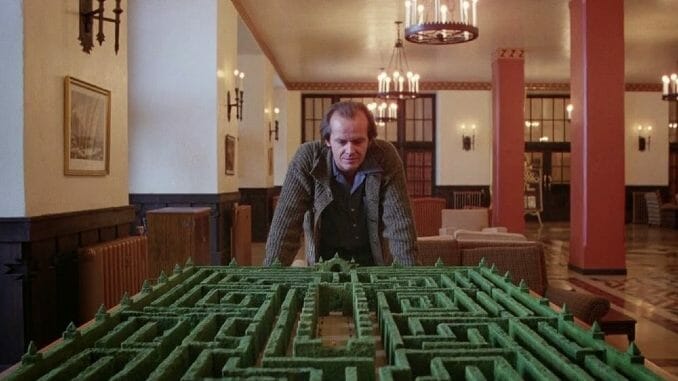
In cinema, as in life, the weather directly contributes to the central conflict of its characters: Heat sizzles disagreements to their breaking point; rain drenches any emotion in melodrama. Snow is a unique cinematic element not only because it’s visually gorgeous, but also because of its versatility in connoting a vast spectrum of human experience. Snow can create a romantic, cozy atmosphere or a terrifyingly bleak one, depending on the perspective of the artist. And what’s better than a snow day movie?
With the post-holiday, pre-spring dregs of winter well underway, what’s better than staying in with a movie that reflects the frostiness outside? Whether you want to snuggle up to a warm romance or bundle through a thriller that will make your blood run cold, there is a perfect snow day movie for you.
Here are 10 of the best snow day movies, presented in alphabetical order:
Compartment No. 6
Year: 2022
Director: Juho Kuosmanen
Stars: Seidi Haarla, Yuri Borisov, Dinara Drukarova
Rating: R
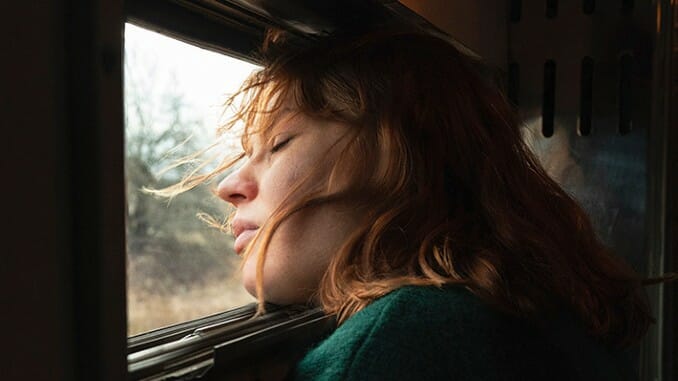
Sometimes trusting yourself means making yourself vulnerable to people you might never have expected, like your alcoholic train companion. The enemies-to-lovers trope is a beloved narrative treasure, but it’s also well-worn territory. Kuosmanen sheds new light on the concept by ridding it of its heavy melodrama, opting instead for intimate, touching moments of one misfit extending kindness to another. Instinctively character-driven writing allows the natural chemistry between Haarla and Borisov to flourish without showing off; they have the space to make more spontaneously visceral choices that convey a shared, tender loneliness. Lyokha’s wiry, occasionally manic energy can’t resist chipping away at Laura’s quiet, watchful reserve. Their characters are drawn to and repelled by each other, usually within the space of a single scene, without burying the audience under a heap of dialogue. Compartment No. 6 may strike some as a boozier Before Sunrise, but it’s more like the drier, Eastern European answer to Before Sunrise’s romantic Western sensibilities. Where Jesse and Céline are two beautiful strangers falling in love at first sight, Laura and Lyokha are two disheveled, weary wanderers who weren’t looking for anything other than a drink and a place to lay their head while begrudgingly on their way to their next destination. They may not find your classic Hollywood romance ending, but they are able to reach a rare, quiet moment of understanding that can only be found at the end of the world.—Katarina Docalovich
Eternal Sunshine of the Spotless Mind
Year: 2004
Director: Michel Gondry
Stars: Jim Carrey, Kate Winslet, Kirsten Dunst
Rating: R
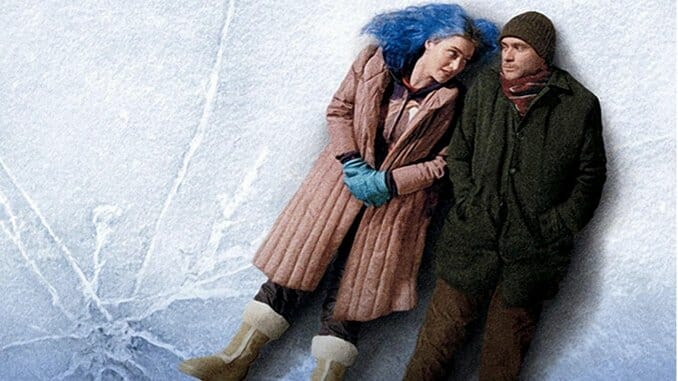
In what might be Charlie Kaufman’s finest script, boy meets girl, unaware that they might be living out a doomed eternal recurrence. A brain-wipe firm allows its clients to erase choice people or events from their memory. Turns out, Joel (a repressed Jim Carrey) and Clementine (a vibrant Kate Winslet) have done this before. Technology is the Great Enabler and, perhaps, a secret destroyer—except that the science fiction aspect of Eternal Sunshine of the Spotless Mind is just an auxiliary to the core relational dynamic. Stripped of fantasy, the film’s theme is no Luddite cautionary tale but rather just a melancholy observation of human relationships. This is how it’s always been. We’re quite accomplished at failing each other…and ourselves. There’s nothing so condemnatory as that statement in Eternal Sunshine, a film that watches and weeps at a whimsical circus breaking down. It immerses us in Joel’s mind, Gondry’s in-camera effects and nearly experimental editing taking us tumbling through the increasingly tragic process of removing Clementine. When I first saw this film in the theater in 2004, I swore I would never do the thing that Joel does to try to heal himself, but I’ve lived some life since then and now I’m not sure I can say the same. I’ve deleted phone numbers and pictures on Facebook, had about a month where I was vigilantly untagging myself; I’m sometimes scared to even look at my feed. It doesn’t matter what the social environment is, humans will use whatever’s available to mitigate pain, especially emotional pain. But sometimes we need the thing we want to be rid of; there’s no actualization without vulnerability, risk, and, inevitably, hurt. The final shot of Eternal Sunshine lingers in my memory, always on loop: Joel and Clementine, stumbling in play away from the camera, on a snowy beach in Montauk. It seems like an extrapolation of the final shot of The 400 Blows: “Stuck in stasis” has become “stuck in repeat.” And, yet, in that shot is acceptance, possibly even hope. There are no spotless minds, but perhaps some still can shine. —Chad Betz
Fargo
Year: 1996
Director: Ethan Coen, Joel Coen
Stars: Frances McDormand, William H. Macy, Steve Buscemi
Rating: R
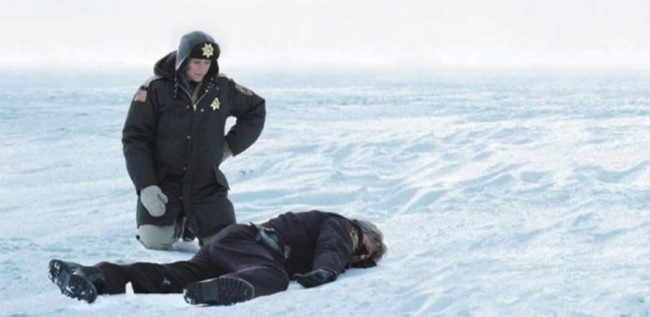
In exploring the unsavory implications of “Minnesota nice,” the Coen Brothers created one of the most beloved, acclaimed and quotable films of all time. Fargo explores the tension that accompanies polite social norms and the quiet desperations they often mask, setting up one scene after another so awkward it’ll make your skin crawl. The emotional restraint displayed by such characters as Jerry Lundegaard (William H. Macy) and Mike Yanagita (Steve Park) is a thin and disingenuous veil over yearnings for money or companionship, while their foil, obviously, is Marge Gunderson (Frances McDormand), who really is that nice and hardworking and downright normal. The Coens strike a careful balance between gentleness and a stark gruesomeness underneath a typical all-American veneer, making you appreciate the art behind postage stamps as deeply as they make you cringe at the sound of a wood chipper. —Allie Conti
Ikiru
Year: 1952
Director: Akira Kurosawa
Stars: Takashi Shimura, Yunosuke Ito, Miki Odagiri
Rating: NR
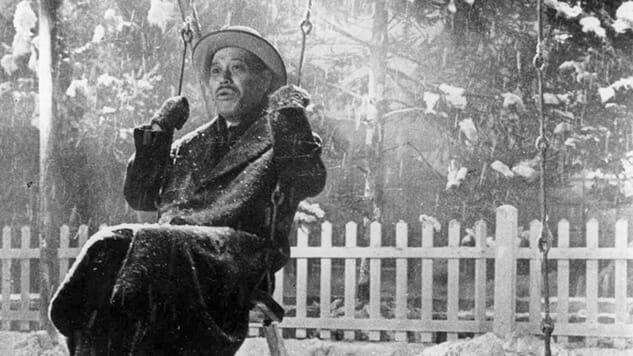
Watching Ikiru, you get the feeling that Leslie Knope would love it: The film is as much a celebration of life as it is of one life in particular, but it’s also an affirmation of what local government can do if just one dogged public servant can grease the wheels of bureaucracy. Ikiru is one of Akira Kurosawa’s finest, a big-scale movie built to house a small-scale story, clocking in at just under two and a half hours as it details the final days of section chief Kenji Watanabe (Takashi Shimura), an aging government employee reeling from a stomach cancer diagnosis. (The doctors give him less than a year to live.) Over the course of Kurosawa’s film, he is guided by two very different figures—a debauched novelist (Yunosuke Ito), and the cheery Toyo (Miki Odagiri), one of Kenji’s subordinates—toward purpose and meaning. A simple life lived in service to others isn’t a life wasted, the film tells us as it throws jabs and japes at the hypocrisy of Kenji’s callous, apathetic peers. A sentimental message, maybe, but one that’s earnestly felt and well earned through the stature of Kurosawa’s craft. —Andy Crump
It’s a Wonderful Life
Year: 1946
Director: Frank Capra
Stars: James Stewart, Donna Reed, Lionel Barrymore, Thomas Mitchell, Henry Travers, Beulah Bondi, Ward Bond, Frank Faylen, Gloria Grahame
Rating: PG
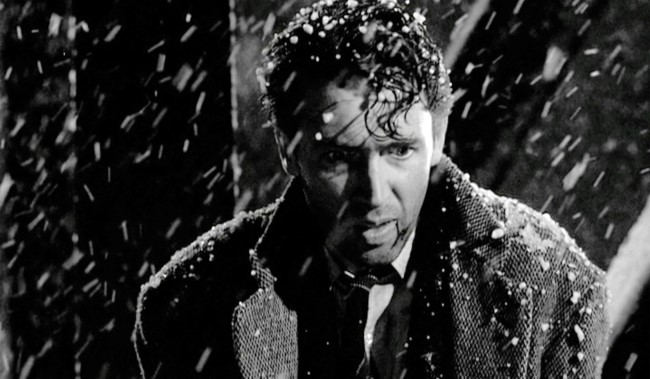
Frank Capra’s Christmas fantasy actually kind of flopped at the box office when it was released, and put Capra on the out-to-pasture list as the studio decided he was no longer capable of scoring a hit. Then it was nominated for five Academy Awards and has become known as one of the most acclaimed films ever made. On Christmas Eve, suicidal George Bailey (the sublime Jimmy Stewart) receives a visit from a sort of junior angel who calls himself Clarence Odbody (Henry Travers). Clarence is charged with pulling Bailey off the ledge, in return for which he will be granted wings. So he shows Bailey visions of his life, progressing from his childhood, showing Bailey all the times he made someone’s live better (or outright saved it). Ultimately Clarence jumps into the river before George can do it; activating the suicidal man to save Clarence rather than kill himself. It’s not enough, so Clarence shows him what the world would look like if he’d never been born. When George sees that his existence has had and continues to have a positive impact on the world, he goes home to his family, Clarence gets his wings and happiness ensues. Yup, it’s a Christmas story. And it’s one of the most enduring ones for a bunch of reasons, including Stewart’s amazing performance and a beautiful script by Frances Goodrich and Albert Hackett along with Capra. (Both Stewart and Capra commented that it was their favorite of all the films they’d respectively worked on.) Timeless, big-hearted and disarmingly sincere, this film is one I defy you to have one cynical comment about. Go on: be cynical. You can’t, right? Right. Because it’s not possible. —Amy Glynn
Snowpiercer
Year: 2013
Director: Bong Joon-ho
Stars: Chris Evans, Song Kang-ho, Tilda Swinton
Rating: R
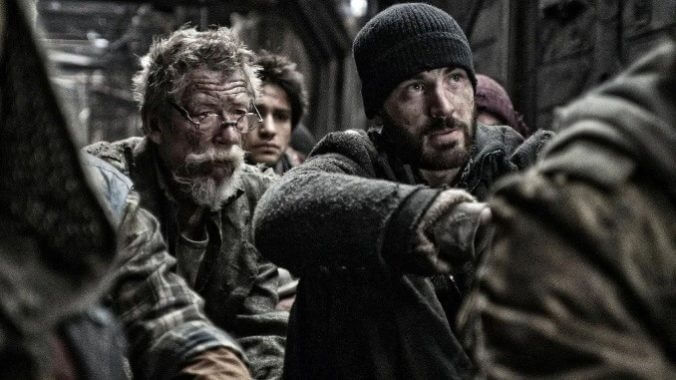
There is a sequence midway through Snowpiercer that perfectly articulates what makes Korean writer/director Bong Joon-ho among the most dynamic filmmakers currently working. Two armies engage in a no-holds-barred, slow motion-heavy action set piece. Metal clashes against metal, and characters slash through their opponents as if their bodies were made of butter. It’s gory, imaginative, horrifying, beautiful, visceral and utterly glorious. Adapted from a French graphic novel by Jacques Lob, Benjamin Legrand and Jean-Marc Rochette, Snowpiercer is a sci-fi thriller set in a futuristic world: Nearly two decades prior, in an ill-advised attempt to halt global warming, the government inundated the atmosphere with an experimental chemical that left our planet a barren, ice-covered wasteland. Now, the last of humanity resides on “Snowpiercer,” a vast train powered via a perpetual-motion engine and governed by a ruthless caste system. Needless to say, this scenario hasn’t exactly brought out the best of humanity. Bong’s bleak and brutal film may very well be playing a song that we’ve all heard before, but he does it with such gusto and dexterous skill you can’t help but be caught up in the flurry. —Mark Rozeman
The Hateful Eight
Year: 2015
Director: Quentin Tarantino
Stars: Samuel L. Jackson, Kurt Russell, Jennifer Jason Leigh, Walton Goggins, Demián Bichir, Bruce Dern, Michael Madsen, Channing Tatum
Rating: R
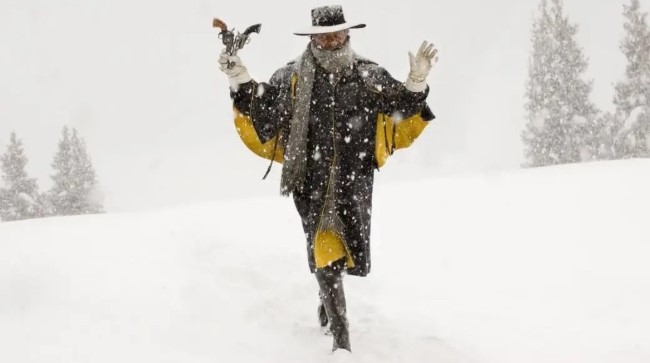
The Hateful Eight is a sprawling film with an intimate core and too much necessary material to trim. There’s a pomp and grandiosity to the weight of the film, and to Quentin Tarantino’s ambition in making it his way, that’s hard not to admire. More so than most marquee movies and tentpoles claiming to be “epic,” The Hateful Eight actually lives up to the word. With this whodunit—or who’s-gonna-doit—Tarantino is chiefly interested in the exchanging of barbs and threats more than he is in action. Make no mistake, The Hateful Eight is insanely violent, but it’s fixated around violent talk and violent reverie before physical violence. Tarantino may lay his timely allegory on thick, but The Hateful Eight bears it out in subtle ways, too: With distrust as the film’s prevailing manner, the notion that you cannot truly know the people with whom you’re having dinner takes on increased gravity and meaning, particularly in the climactic showdown, when all is revealed and we see the film’s various humans for who they truly are. Frontier justice does quench our thirst, but the themes of social justice that drive the film are more satiating by far. It all adds up to a towering work, as profound as it is profane. —Andy Crump
The Shining
Year: 1980
Director: Stanley Kubrick
Stars: Jack Nicholson, Shelley Duvall, Danny Lloyd, Scatman Crothers
Rating: R
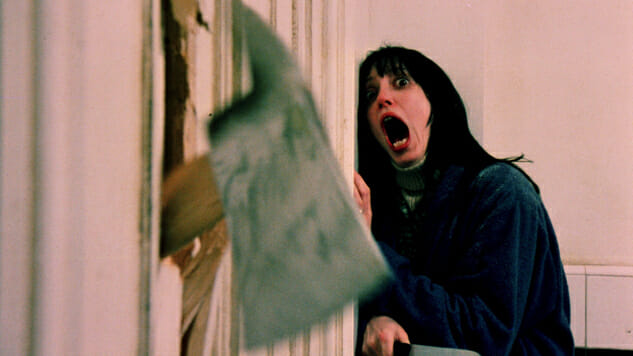
As an aural-visual experience, The Shining is likely the single most distinctive horror film ever made. Its droning soundtrack, innovative Steadicam shots and singular images, like that of the two little Grady girls standing in the hallway, beckoning to Danny, are instantly recognizable even to people who have never explored horror cinema. Its most famous sequences, such as Danny scrawling “redrum” on the wall or Jack chopping down the bathroom door to get to Wendy, are so deeply embedded in pop culture at this point that references to them will be easily understood until the end of recorded history. At the same time, though, The Shining also still rewards scholarly analysis of its elements that are less known to the casual cinemagoer, such as Kubrick’s unique use of dissolves layered on top of one another to create composite images, or the seemingly purposeful continuity errors that pop up in a handful of scenes. These small details have for decades fueled mysteries and conspiracy theories about the director’s true intent, as was captured beautifully in The Shining documentary Room 237 by Rodney Ascher. Watching that film, one begins to understand how a movie such as The Shining can draw forth deep, primordial responses from its audience, such as the all-consuming need to understand. It is telling that, unlike some of the other great horror films on this list, The Shining saw few attempts at what you’d call direct imitation in the years that followed. It was too much the product of an auteur mind to be so easily unwrapped and reverse engineered; nor was its initial reaction entirely positive, contrary to what you might now assume. It was and remains an exceptional film of great beauty, coldness, precision, calculation and yes, fright.—Jim Vorel
The Umbrellas of Cherbourg
Year: 1964
Director: Jacques Demy
Stars: Catherine Deneuve, Nino Castelnuovo
Rating: NR
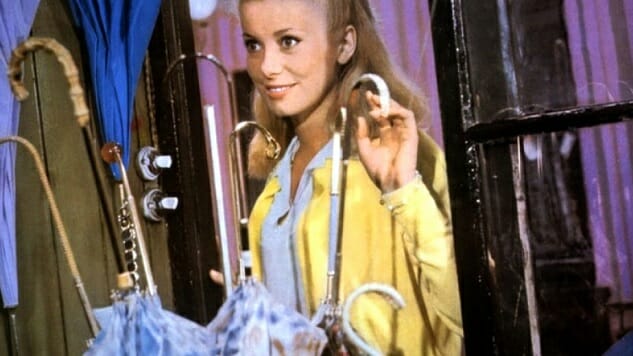
Jacques Demy’s masterpiece is a soaring, vibrant, innately bittersweet story of love lost, found and forever disbanded, another wartime casualty in a country scarred by military conflict. The Umbrellas of Cherbourg is lived-in, a story derived from Demy’s life experience, and that keyword—“experience”—is essential to making the film click. Take away its musical cues, and you’re left with a narrative about a young man (Nino Castelnuovo) and a young woman (Catherine Deneuve) who fall deeply in love with one another, only to be torn apart when he’s drafted to fight overseas. The story remains rooted in Demy’s pathos, and pathos gives Umbrellas’ gravity. The music, of course, is a critical part of its character, a dose of magic Demy uses to buttress the rigors of life in wartime with grandeur and meaning. It’s a film about people in love falling out of love, and then falling in love all over again with new partners and altered sentiments, a beautiful picture as likely to make you swoon as to crush your heart. —Andy Crump
Winter’s Bone
Year: 2010
Director: Debra Granik
Stars: Jennifer Lawrence, John Hawkes, Kevin Breznahan, Dale Dickey, Garret Dillahunt, Sheryl Lee, Tate Taylor
Rating: R
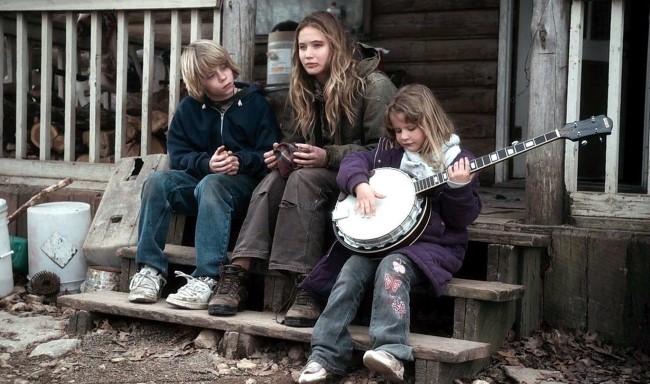
Watching Winter’s Bone is like entering into an entirely different world, director Debra Granik vividly capturing the sights and sounds of the Ozark mountains in a way that’s stylized yet feels completely natural to the setting. But that’s all just beautiful wrapping around Jennifer Lawrence’s stunning performance as a 17-year-old raising her two younger siblings, supporting her mother and trying to find the whereabouts of her deadbeat father before their house is taken away. Granik takes this search plotline in dreadful new directions, and while Lawrence may end up battered by her community and nearly starved by an indifferent society, she never loses her dignity. Winter’s Bone is simultaneously depressing and uplifting, showing us the worst of humanity without ever giving in to it. —Sean Gandert






































